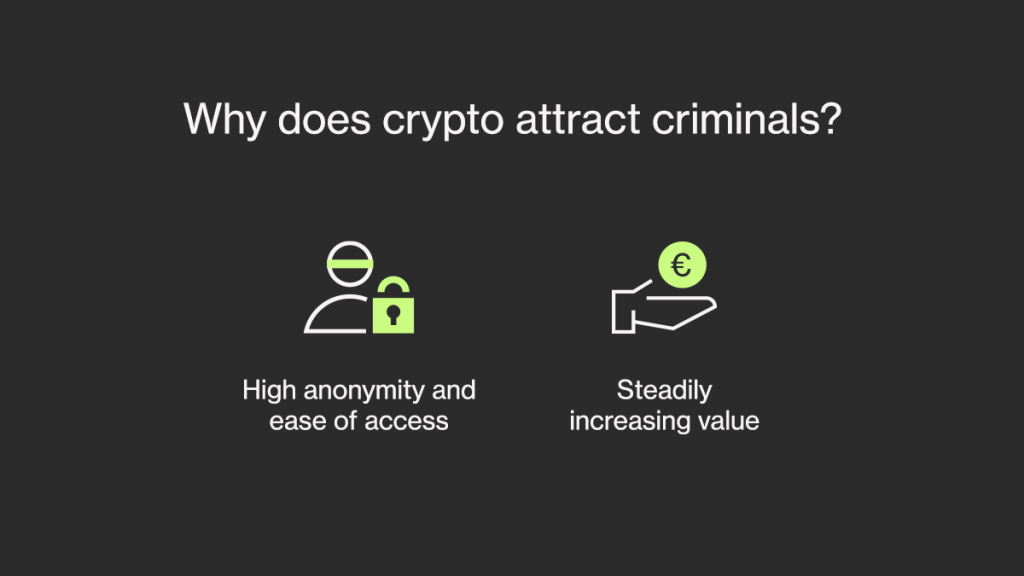Cryptocurrencies are a form of digital currency that’s generated and stored on the blockchain network. It’s not controlled by any bank or government, so it offers some advantages over traditional methods of payment and investment. However, because cryptocurrency isn’t fully regulated yet, it has become an attractive option for criminals looking to fund their activities without being detected.
For more information, check out our article on cryptocurrency regulation around the world. If you’re looking for a comprehensive view on particular regions, visit cryptocurrency regulations in Europe and crypto in the United States.
Why Does Cryptocurrency Crime Happen?

Cryptocurrency operates independently of central banks, making it difficult to trace. It’s anonymous and decentralized, meaning that no one can prove its value or trustworthiness. However, there’s another reason why cryptocurrency might be a tempting target for fraudsters: its popularity is growing among people who want something stable or valuable enough to store large amounts of money. As crypto becomes more mainstream, more criminals are tempted to exploit the system.
High Anonymity and Ease of Access
Cryptocurrency is anonymous — and that’s a problem. It’s easy to buy cryptocurrency, and it usually doesn’t require identification at all. You can buy crypto assets in 10 minutes using Coinbase or LocalBitcoins. While some exchanges only accept bank transfers or wire transfers, others do not require any identity verification, making your purchase anonymous.
Anonymity is a major motivator in crypto-related crimes. Criminals don’t like identification because they don’t want law enforcement agencies tracking their activities across different platforms or jurisdictions. This way, they can use crypto as payouts for such cyber attacks as ransomware and many other crimes. They may also be buying drugs from darknet marketplaces.
Steadily Increasing Value
Despite big setbacks, crypto has seen a dramatic increase in value over the years. Some experts project that even with wild fluctuations, the value of cryptocurrency is likely to continue increasing down the road. This means that plenty of new players will join the crypto market, which may result in exponential growth of fraud.
How Does Identity Verification Help in the Fight against Cryptocurrency Crime?

Identity verification is the foundation of KYC/AML compliance. KYC and AML are compliance standards that help prevent money laundering, terrorism financing, and fraud. The more information you can verify about your customers, the better equipped you will be to spot suspicious activities and report them to law enforcement if necessary.
The importance of identity verification in fighting crime cannot be understated: it’s one of the best ways we have at our disposal for keeping criminals at bay, even as technology becomes more powerful in facilitating their crimes.
How Is Crypto Regulated?
With the increase in digital currency transactions, it’s important to ensure that users are who they say they are. The Financial Crimes Enforcement Network (FinCEN) is working with cryptocurrency exchanges to help reduce fraud risk, especially by implementing KYC/AML compliance programs for users. These programs require an individual to verify identity by uploading documents such as a passport or driver’s license before trading.
Some of these exchanges have also implemented tools like biometric authentication that can confirm a person’s identity without requiring them to submit additional documents upon signing up.
Meanwhile, many governments around the world are introducing a 'travel rule’. Recently, the European Parliament and Council reached a provisional agreement on a new bill to regulate crypto-asset service providers (CASPs) in the region. The new framework, MiCA, requires crypto transfers to be transparent by implementing a crypto travel rule. No matter the transaction amount, every crypto asset service provider must retain information on the transaction’s originator and beneficiary. Currently, the threshold amount in the EU is 1,000 euros.
What this means for crypto traders and exchanges is that to continue their operations in Europe, they will have to implement identity verification procedures. However, this doesn’t only apply to Europe. Many countries around the world are preparing regulatory crypto frameworks that also include the travel rule.
Conclusion
The rise of cryptocurrency has made it easier than ever for criminals to get away with their crimes. However, new regulations and improved identity verification processes are making it harder than ever before for them to do so undetected. The world of virtual currency is still in its infancy, but as more people start using it for legitimate purposes like trading or investing in, the more likely criminals will be caught trying to use them illegally.



